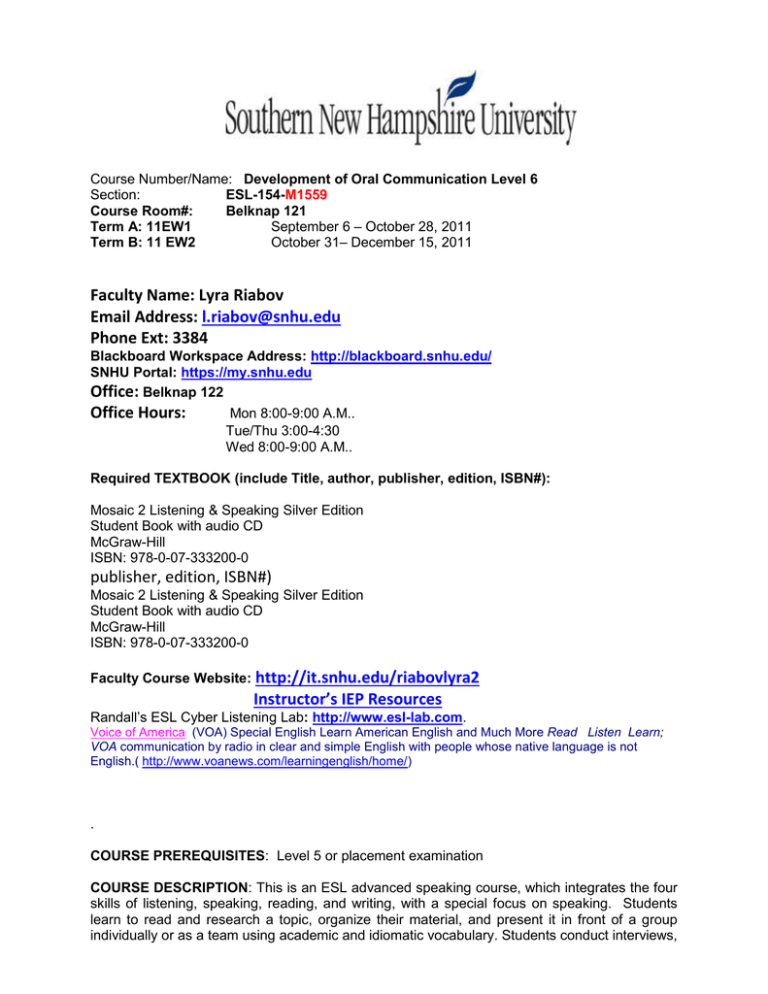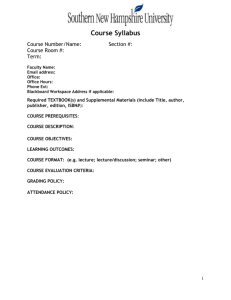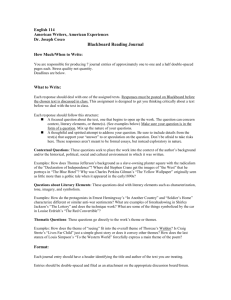ESL 154 Oral Communication - Home
advertisement

Course Number/Name: Development of Oral Communication Level 6 Section: ESL-154-M1559 Course Room#: Belknap 121 Term A: 11EW1 September 6 – October 28, 2011 Term B: 11 EW2 October 31– December 15, 2011 Faculty Name: Lyra Riabov Email Address: l.riabov@snhu.edu Phone Ext: 3384 Blackboard Workspace Address: http://blackboard.snhu.edu/ SNHU Portal: https://my.snhu.edu Office: Belknap 122 Office Hours: Mon 8:00-9:00 A.M.. Tue/Thu 3:00-4:30 Wed 8:00-9:00 A.M.. Required TEXTBOOK (include Title, author, publisher, edition, ISBN#): Mosaic 2 Listening & Speaking Silver Edition Student Book with audio CD McGraw-Hill ISBN: 978-0-07-333200-0 publisher, edition, ISBN#) Mosaic 2 Listening & Speaking Silver Edition Student Book with audio CD McGraw-Hill ISBN: 978-0-07-333200-0 Faculty Course Website: http://it.snhu.edu/riabovlyra2 Instructor’s IEP Resources Randall’s ESL Cyber Listening Lab: http://www.esl-lab.com. Voice of America (VOA) Special English Learn American English and Much More Read Listen Learn; VOA communication by radio in clear and simple English with people whose native language is not English.( http://www.voanews.com/learningenglish/home/) . COURSE PREREQUISITES: Level 5 or placement examination COURSE DESCRIPTION: This is an ESL advanced speaking course, which integrates the four skills of listening, speaking, reading, and writing, with a special focus on speaking. Students learn to read and research a topic, organize their material, and present it in front of a group individually or as a team using academic and idiomatic vocabulary. Students conduct interviews, participate in structured role plays, practice pronunciation, discuss differences, and share opinions. COURSE OBJECTIVES& LEARNING OUTCOMES: Students will learn: Speak using their notes based on their reading and listening to the model texts. Present an oral project based on their research using library and the Internet resources. The use of PowerPoint is encouraged. Utilize academic and appropriate idiomatic language and vocabulary in presentations and discussions. Analyze video and audio recordings of the students’ presentations focusing on the content and the form, also, in order to increase students’ awareness of language errors, Participate in the Discussion Forums in the Blackboard, Use a variety of communicative strategies to improve fluency and vocabulary use, Access library and the Internet resources, Organize ideas, Express principal points, nuances, and inferences, Deliver effective presentations, using well-modulated volume and intonation patterns. COURSE FORMAT: (e.g. lecture; lecture/discussion; seminar; other) Listen, discuss, present, record and assess using multimedia Students will participate in culture integration combined classes with domestic students and improve their speaking and communication skills COURSE EVALUATION CRITERIA: : Students are expected to buy text books with CDs, take accurate notes in class, revise material every day, and complete all the quizzes and tests. Handouts must be organized in students' binders. English - English Dictionary is required. Students are expected to participate in the Blackboard Discussion Forums, class discussions and role plays. Students are expected to use instructor’s class website. Students use self – assessment rubrics to analyze their recordings. Quizzes/Tests/Exams: Tests are at the end of each theme; the final Exam and the TOEFL are at the end of the semester. All the dates are in the attached Weekly Assignments table GRADING POLICY: A grade will be given at the end of the course based on the following criteria: Test and Quizzes Participation in Class and Blackboard Discussions Attendance ATTENDANCE POLICY: 70% 20% 10% Attendance is required. It is the student's responsibility to fill in missing material. Students will receive letters of warning after 15 and 25 class absences. If a student arrives late for class and miss roll call, he/she will be counted absent. If a student has more than 30 absences he/she will be required to meet with the ILE Director and could be dismissed from ILE and Southern New Hampshire University. PLAGIARISM POLICY: SOUTHERN NEW HAMPSHIRE UNIVERSITY POLICY STATEMENTS: https://my.snhu.edu/Academics/Pages/SyllabiStatements.aspx Disability Services ADA/504 Compliance Statement Southern New Hampshire University is committed to and concerned with meeting the needs of students challenged by physical, sensory, psychiatric and/or learning disabilities with regard to the Americans with Disabilities Act (ADA), as amended, and Section 504 of the 1973 Rehabilitation Act. At the beginning of each term, or as soon as you become aware of a disability, we encourage you to contact the Office of Disability Services to discuss accommodations for which you may be qualified. For questions concerning support services, documentation guidelines, or general disability issues: Office of Disability Services, Exeter Hall, Suite 59 Hyla Jaffe, Director 603.626.9100 ext.2386 h.jaffe@snhu.edu For questions concerning disability related compliance matters, grievance or legal issues: Ms. Jet Goldberg, ADA/504 Compliance Officer Director of Wellness Center 603-645-9679 j.goldberg@snhu.edu Library Resources Statement In addition to the intellectual resources available on site and online (http://www.snhu.edu/library), Shapiro Library makes available group and one-on-one instruction in information literacy, enabling students to define and articulate what knowledge-based resources are relevant to their research interests. Library staff are available to assist students in effectively and efficiently accessing information from credible sources, to compare new knowledge with prior beliefs, and to consider the related ethical, legal, and socio-economic issues that are inherent in scholarly investigation. Copyright Policy Southern New Hampshire University abides by the provisions of United States Copyright Act (Title 17 of the United States Code). Any person who infringes the copyright law is liable. The SNHU Copyright Policy can be accessed from the Shapiro Library’s Copyright LibGuide at http://libguides.snhu.edu/content.php?pid=5411. Questions regarding copyright may be addressed to the Dean of the University Library. Academic Honesty Policy* Southern New Hampshire University requires all students to adhere to high standards of integrity in their academic work. Activities such as plagiarism and cheating are not condoned by the university. Students involved in such activities are subject to serious disciplinary action. Plagiarism is defined as the use, whether by paraphrase or direct quotation, of the published or unpublished work of another without full and clear acknowledgment. Cheating includes the giving or receiving of unauthorized assistance on quizzes, examinations or written assignments from any source not approved by the instructor. *For a full definition of academic dishonesty please refer to the undergraduate or graduate catalogs. Blackboard™ The use of Blackboard™ is required in this course. Blackboard™ is the free software that the university uses to enhance learning. It is available through any web browser (Netscape, Internet Explorer). Instruction in how we will use Blackboard™ will be covered in class. WEEKLY SPEAKING & READING/ASSIGNMENTS/TESTS SCHEDULE: Based on Mosaic 2 Listening/Speaking course planner Week/Date 9/6 Week 1 9/8 Assignment/Themes Placement Testing TERM 1A Introduction to the course Oral ice-breakers. Students’ introductions Introduction of the text book and its structure and its website resources. Skills/Tests/Exams Learning of the use of the Blackboard Learning of the use of the Introduce yourself in a Discussion Forum in the Blackboard 9/9 Week 2 9/13 9/15 9/15 Week 3 9/20 9/22 9/22 Week 4 9/27 9/29 9/26 10/6 Week 5 Chapter 1 Theme: Language and Learning Part 1 p.3-6 Connecting to the topic Building Background Knowledge Activity: Walking Tour of Manchester/Scavenger Hunt Chapter 1 Theme: Language and Learning p.7,11,12,13,15,16 Expressing opinions about time spent in school, philosophies of education, and traditional schooling Recollecting favorite/least favorite teachers and best/worst school experiences Discuss which types of students do best in school Deliver a short presentation: English learning biography (Graded) Combined Class with EDU 235-05 Critical Thinking: Speculating who does best in school and why Utilizing introduction, body and conclusion to discuss the main ideas in a lecture Evaluating a lecturer’s style Understanding and using new vocabulary in discussions about schooling instructor’s website and online resources Speaking strategies: Small talk Discussion Forum in the Blackboard Comparing answers to questions about main points Request the main points during lectures and situation role plays Class 1 M-3 Evaluating speakers’ effectiveness in getting to the point Evaluating appropriateness of expressions and tone of the voice Combined Class with EDU 235-05 Class 2 M-3 Chapter 2 Theme: Danger and Daring p.20 Speaking Strategy: Sharing opinions and personal thrilling Small talk experiences. Discussion Forum in the Compare note-taking methods and results with Blackboard classmates Responding to questions with a variety of yes and no expressions Combined Class with EDU 235-03 Field trip: Lake Winnipesauke Chapter 2 Theme: Danger and Daring p.20 Giving and taking a survey on risk taking Class 1 M-3 Using a prepared outline to give a presentation (Graded) 10/4 10/6 10/10 Week 6 10/11 10/13 Understanding and using new vocabulary in discussions about danger and daring Columbus Day Chapter 3 Theme: Gender and Relationships p.40 Discussing admired qualities of men and women Discussing boys’ and girls’ leisure activities No classes Understanding and using new vocabulary in discussions about adolescence and passage of Discussing important rites of passage Recollecting experiences from adolescence Expressing congratulations and condolences in a role play 10/13 Week 7 rites Class 3 M-3 Writing and presenting roleplay dialogues (Graded) 10/18 Combined Class with EDU 235-05 Chapter 3 Theme: Gender and Relationships p.40 Sharing cultural expressions of congratulations and condolences 10/20 10/17 10/24 Week 8 Combined Class with EDU 235-03 Combined Class with EDU 235-03 Chapter 7 Theme: Working p.122 Class 2 M-3 Class 3 M-3 Learning strategy: Internet research 10/25 10/27 10/31 11/1 Week 1(9) 11/1 11/3 Week 2(10) 11/8 11/10 11/10 Week3(11) Project: Working assignment(see the handout) Placement testing (for arriving students only) and midterm conferencing(for current students only) No classes Term B Classes Begin Introduction to the course Oral ice-breakers. Students’ introductions Introduction of the text book and its structure and its website resources. Introduce yourself and your country in a Discussion Forum in the Blackboard Critical thinking: Speculating, ranking criteria, researching assumptions about job satisfaction Chapter 7 Theme:: Working p.122 Project: Working assignment(see the handout) Sharing personal experiences of good and bad jobs and ideas about “perfect” job Discussing criteria for job satisfaction Debating work-related issues Chapter 7 Theme: Working p.122 Role-playing people persuading and giving in (graded) 11/15 Field Trip: Boston Duck Tours Chapter 9 Theme: Art and Entertainment p.164 Discussing the effects of Rock ‘n’ Roll in countries around the world 11/17 Sharing music preferences 11/15 Discussion using cause and effect Combined Class with EDU 200 Identifying and using expressions used to introduce persuasive arguments, enticing offers, and giving in Using specific strategies to distinguish between fact and opinion Class 1 M-3 Week4(12) 11/22 11/22 11/23-11/25 Week5(13) 11/29 Chapter 9 Theme: Art and Entertainment p.164 Completing conversation with appropriate expressions of doubt and disbelief Role plays and mini presentations critiquing art (graded) Combined Class with EDU 200 Thanksgiving Chapter 10 Conflict and Resolution p.186 Sharing experiences with conflicts Discussing RA duties and conflicts in dorms Class 2 M-3 No classes Combined Class with EDU 362 Chapter 10 Conflict and Resolution p.186 Sharing notes to answer exam questions Asking and answering exam questions Understanding and using new vocabulary words in discussions about dealing with conflicts Combined Class with EDU 200 TOEFL IBT and Paper TOELF Preparation Listening for and noting important information likely to be on exam Practice TOEFL taking skills Class 1 M-1 Role-play characters who must acquiesce or express reservations Post your reflections in the Blackboard and record them 12/1 11/30 Week 6(14) 12/6 12/8 12/6 Week 7(15) 12/13 12/14 12/15 12/16 – 1/8 1/9 2011 1/11 TOEFL TEST Activity: End of Semester Faculty & Student Holiday Party Faculty/Student conference &advising day Winter Break Placement Testing (for arriving students only) Term A Classes Begin (Spring Session) Class 3 M-3 Final Exams No classes


